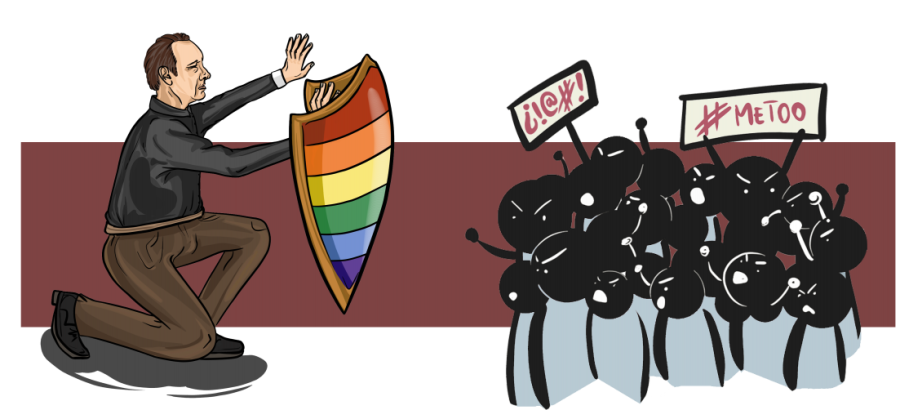Spacey uses gay identity as excuse for sexual assault
An acclaimed actor’s response to recent allegations sets back LGBTQ agenda
December 7, 2017
The coming out of a prominent figure in entertainment usually induces a warm welcome from the LGBTQ community. Actor Kevin Spacey’s recent coming out, however, was met with strong disapproval and rejection. On Oct. 29, actor Anthony Rapp accused Spacey of sexually assaulting him when Rapp was a minor. The next day, Spacey released a formal statement on Twitter to address the allegation, attributing his actions to “inappropriate drunken behavior” and continuing with a discussion about his own sexuality by coming out as gay. Spacey’s attempts to deflect attention from allegations against him by means of revealing his gay identity should be condemned, for they silence victims and reflect poorly on the LGBTQ community.
A wave of individuals coming out with their sexual assault stories began in October, when dozens of women came forward with sexual assault and harassment allegations against producer Harvey Weinstein. Numerous prominent men in entertainment, politics and media have been accused of sexual misconduct, Spacey included. Rapp, who currently stars in Star Trek: Discovery, came forward with allegations that Spacey made sexual advances toward him in 1986, when he was 14. At the time, Rapp was a child Broadway actor on Precious Sons, and Spacey was working on a revival of Long Day’s Journey Into Night. The two met at an afterparty, and Spacey later invited Rapp to a party in his apartment. Still a 14-year-old at the time, Rapp became bored at the party and ended up watching TV in a bedroom. After the party ended, Spacey allegedly picked Rapp up and attempted to lay on top of him on the bed.
At the time of the assault, Spacey was not a well-known actor. But as Spacey’s fame grew, Rapp began to share his experience with his friends. When the Weinstein scandals came to light, Rapp felt obligated to publicly name Spacey as the perpetrator of the assault. Rapp stated that he wanted to bring greater attention to these matters and discuss them openly. Within hours of the release of Rapp’s allegations, Spacey left a statement on Twitter apologizing to Rapp for his actions and claiming that he had no recollection of the events. He then proceeded to shift the discussion to his personal life, stating that he would now choose to live as a gay man.
High-profile figures such as Spacey must be held responsible for using their power to silence the vulnerable. Spacey’s use of his sexuality as an excuse for his behavior is particularly manipulative, as it holds his victims against the threat of “outing,” or exposing Spacey’s homosexuality or the victim himself. Because many victims of Spacey’s inappropriate advances were male, opening up about the incidents would have “outed” Spacey, which would hold them responsible for damaging his reputation. Victims who come forward may also be seen “outing” themselves. Some journalists who have reported on Spacey have accused him of making inappropriate sexual advances toward them and recall being berated by Spacey for refusing his advances; they were told that their denial was cowardly and a reflection of their lack of sexual acceptance. Even then, Spacey used his sexuality, though unclear at the time, as a shield of privacy to halt further investigation into his wrongdoings.
“In Weinstein’s case, he was this powerful director, preying upon actresses whose careers are already so fragile,” said junior Jessabelle Delen. “For Spacey, it was an adult preying upon a child actor, whose career is also vulnerable. The assailants are powerful and influential men who have reputations in their fields, reputations that would have us quickly take their side because it’s difficult to accept that someone who’s beloved could be capable of something so despicable.”
Additionally, Kevin Spacey’s decision to come out amid the sexual harassment allegations against him perpetuates harmful stereotypes about gay men. One such stereotype is rooted in the idea that two men’s sexual attraction to one another is never out of genuine connection. This stigma is dehumanizing and reduces gay men to sexual objects and predators. Historically, gay men have also been associated with child predators, and queer individuals have been prevented from holding authoritative positions over children, such as teaching or leading Boy Scout troops. Since the 1970s, this misconception has been dying, but Spacey’s actions rekindle the conflation between queer sexuality and pedophilia, fueling anti-LGBTQ arguments that use fear-mongering as a tactic against queer people. By feeding into this ideology, Spacey insinuates that it is excusable for him to prey on minors because it is natural for him as a gay man.
“[Spacey’s actions] reflect really badly on the LGBTQ community,” said senior Amber Lee, President of Intersections, a social justice club on campus. “Everyone has responsibility within a community, regardless of sexual orientation, and for him to try to sideline his actions is very disrespectful of the LGBTQ community. It is pretty terrible and very irresponsible of Spacey to lump his apology and coming out together. Even though Spacey is part of the [LGBTQ] community, he perpetuates a stereotype that really harms the community.”
By focusing the discussion on his sexuality, Spacey tiptoes around the severity of the allegations directed toward him. While most coming out stories are praised and well received by the LGBTQ community, Spacey’s is not, and he is rightfully criticized for his timing in coming out.
Spacey’s statement instigates a shift in narrative, from a sexual harassment victim’s brave decision to open up about his experience to a celebrity’s coming out. Ultimately, Spacey manipulates the media to gloss over the victim to focus on the story of the figure in power.
“Spacey spent more time explaining his sexuality and why he is coming out rather than apologizing to Rapp, showing that Spacey is more concerned about people making assumptions about his sexuality rather than being a sexual assailant,” said Delen. “Spacey’s response takes away from the recovery and peace of mind that Rapp deserves. It was not an apology to Rapp; it was a defense of his actions. It attempts to invalidate Rapp’s trauma.”
Since the release of Spacey’s statement, many entertainment figures including actress Rose McGowan, who claimed that she was raped by Harvey Weinstein, and Beau Willimon, the creator of “House of Cards”, have expressed their disapproval and anger at Spacey’s actions. Netflix has consequently announced that it will suspend production of “House of Cards,” the show in which Kevin Spacey starred. While many aspects of the Spacey incident are still unclear and troubling, the entertainment industry has largely responded appropriately, by showcasing an intolerance for sexual misconduct in spite of the sexuality of the perpetrator.
Spacey’s attempts at damage control associate his sexual advances with his newly announced sexual identity and take advantage of victims’ lack of power as well as the LGBTQ community to mitigate controversy. It is imperative to recognize that the abuse of power by individuals accused of harassment, no matter the perpetrator’s sexuality, is not permissible.


































































